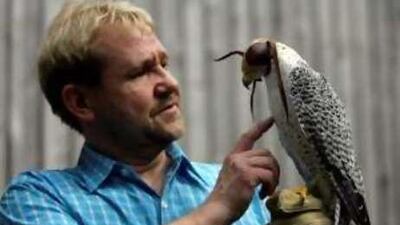BERLIN // Pollution from a mushroom farm has killed hundreds of falcons on a breeding centre that sells primarily to Arab buyers, including many from the United Arab Emirates, the owner has claimed in a lawsuit. Hans Jürgen Küspert, who runs the "Falcon Centre" in the German village of Helvesiek, has lost so many falcons in recent years that he moved the surviving ones to a breeding farm he has in Spain.
"First the birds get severe breathing difficulties, then they fall dead to the ground," the breeder told Der Spiegel, Germany's leading news magazine. Tests revealed a green fungus in the lungs of virtually all the dead birds. Called Aspergillus fumigatus, it is commonly found in soil and compost heaps and is regarded as harmless to healthy humans. Mr Küspert believes fungus spores emitted by a nearby mushroom farm have been killing his birds.
He confirmed to The National that he had filed a lawsuit against the farm. "We aren't using this site at the moment and have transferred all our animals to Spain," he said. "We're having huge problems here which is why we have moved. We are still suing for damages here because we want to re-open the site once the neighbouring mushroom farm has been ordered to reduce its emissions." Mr Küspert added that the falcons at his breeding operation in Spain did not have health problems. He declined to comment further, saying: "It could damage my business in the Emirates."
Falcon breeding is a lucrative business. The birds are popular in Arab countries, where they are regarded as symbols of freedom, pride and status. Many of the hunting falcons in the UAE come from breeding farms in Germany and Austria. Clients pay an average of ?5,000 (Dh24,000) for a young bird. Mr Küspert is claiming ?3.5 million in damage compensation from the mushroom business, Pilzgarten, which cultivates delicacies such as shiitake, king trumpet and pink oyster mushrooms on a damp substrate of wood chips that emits fungus spores, according to Der Spiegel.
To provide evidence for his lawsuit, he is storing some 600 dead falcons in a freezer where he used to keep food. Pilzgarten has rejected Mr Küspert's accusations. It said in a statement on its website: "Pilzgarten does not generate emissions that are any more dangerous to humans or animals than any other forms of agricultural work." The firm has suggested that there might be other factors harming the birds, such as stress, excessively dry air, a lack of vitamin A, poor air quality or unhygienic conditions.
Scientists have been measuring the level of fungus spores in the air on the falcon and mushroom farms as part of the lawsuit, but there has been no court ruling yet. Mr Küspert wants the mushroom firm to build hermetically sealed halls to stop the spores from escaping, but the company said that would cost too much. The issue boils down to whether the spores are too harmful and constitute air pollution, or whether Mr Küspert's birds are too fragile to cope with their environment. The problem for Mr Küspert is that Germany does not have any specific laws governing the proximity of falcon breeding and mushroom growing.
Mr Küspert set up his business in 1990, before the mushroom farm opened next door. The 15-hectare falcon-breeding site is surrounded by barbed wire and monitored by surveillance cameras. It used to be on the itinerary of many an Arab sheik visiting Germany. He began expanding heavily a decade ago, investing ?6.5 million in a showroom and guestrooms on the farm, but the birds began dying before his plans were finalized. He now runs his business from his second farm in the Pyrenees.
@Email:foreign.desk@thenational.ae

